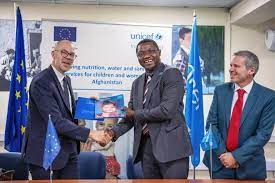UNICEF welcomes new EU funding to fight malnutrition and scale up water and sanitation services in Afghanistan

Brussels: The European Union (EU) has provided EUR 15 million to UNICEF to prevent and treat malnutrition among women, adolescent girls and children and to improve water and sanitation services in Afghanistan.
Afghanistan remains one of the worst humanitarian crises in the world with about 29 million people, including 15.8 million children and 11 million women requiring humanitarian assistance. In its third consecutive year of drought, the country is also recovering from the effects of 40 years of conflict, recurrent natural disasters, and disease outbreaks. High rates of malnutrition and food insecurity are linked to the limited access to basic water and sanitation services, affecting the overall health and wellbeing of women and children in particular.

The EU’s contribution will enable UNICEF to scale up treatment for malnutrition in health facilities and nutrition day care centres and to deploy additional health workers to overcrowded health facilities. The project will also support the construction of 40 solar-powered water supply systems in 40 communities; deliver life-saving information and services on nutrition, maternal and adolescent health and empower adolescent girls with income generating skills.
*“With recurring dramatic climate change effects reducing harvests, fighting malnutrition and expanding water, hygiene and sanitation services to the Afghan people remains urgent”, *saidMr. Peteris Ustubs, Director for the Middle East, Asia and Pacific of the European Commission’s Directorate for International Partnerships.
Ms. Raffaella Iodice, EU Chargée d’Affaires to Afghanistan, further stressed that “This new partnership will help reach even more Afghans, in particular children, adolescent girls and women and assist them to cover their daily basic needs”.
The 27-month programme will be implemented across 22 provinces in Afghanistan, targeting 1.7 million children and mothers with nutrition services; 80,000 people with safe drinking water; 206,000 with hygiene and sanitation services and 6,000 adolescent girls with skills and vocational training.
“As the children of Afghanistan continue to face multiple challenges, we count on the support of partners like the EU to respond to the crisis and improve the health and wellbeing of children and their families. This new package of integrated services will help to address some of their most urgent needs,” said Dr. Tajudeen Oyewale, UNICEF Representative to Afghanistan.
This project builds on the EU’s previous support to improve the wellbeing of the children of Afghanistan through investments in education, health, nutrition, child protection and water and sanitation services.





